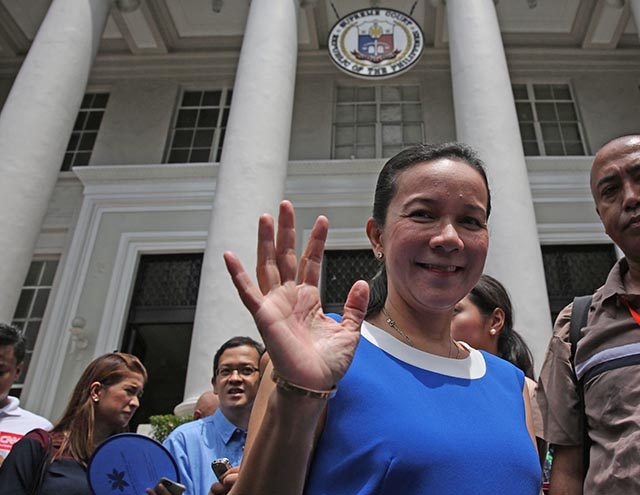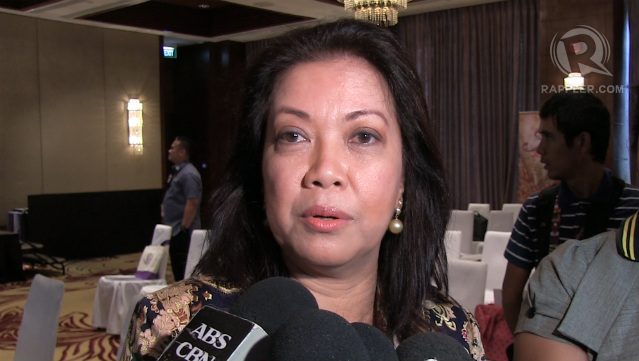SUMMARY
This is AI generated summarization, which may have errors. For context, always refer to the full article.

MANILA, Philippines (UPDATED) – The Supreme Court faces a novel case – whether a foundling running for president is a natural-born Filipino – and the much-awaited decision of majority of its 15 members (if President Aquino appoints a replacement for recently retired Justice Martin Villarama Jr.) will be a milestone in Philippine jurisprudence.
At the same time, it is such a high-profile and politically charged case that some members of the Court are expected to weigh it not on its merits alone. Influences will include personal interests and election dynamics, given that, in the Philippine setting, the Court is a politicized institution, not insulated from external pressures. (READ: Aquino classmate leads shortlist for SC vacancy)
But being a foundling is not the only legal issue hounding Senator Grace Poe, the candidate at the center of this legal storm. All point to her eligibility to run for the highest post in the land.
Lawyers and academics have made their case in pleadings to the Commission on Elections (Comelec) that Poe – a former naturalized American citizen who lived in the US – lacks the 10-year residency in the Philippines, a basic requirement for those running for higher office.
Intertwined with this is the alleged use of her US passport after she had renounced her foreign citizenship, making her unqualified to seek elected office.
The Comelec has ruled against Poe and cancelled her certificate of candidacy (COC). On these 2 points – residency and use of a foreign passport – the Court has precedents to guide it.
The most recent decision on residency is Caballero vs. Comelec, handed down in September 2015, and affirmed by 12 justices without anyone dissenting. It appeared to be a cut-and-dried case.
Justice Diosdado Peralta penned the decision. Chief Justice Maria Lourdes Sereno, Justices Antonio Carpio, Presbitero Velasco Jr, Teresita Leonardo-De Castro, Arturo Brion, Lucas Bersamin, Mariano del Castillo, Martin Villarama, Jose Perez, and Marvic Leonen all concurred. One took no part because of prior involvement with the case as solicitor general (Francis Jardeleza) while three were on leave (Jose Mendoza, Bienvenido Reyes and Estela Perlas-Bernabe).
Caballero case
This has to do with Rogelio Caballero who ran for mayor of Uyugan, Batanes in 2013. His rival, Jonathan Enrique Nanud, asked Comelec to cancel Caballero’s COC because he supposedly “misrepresented” himself since he was a Canadian citizen and a non-resident of Uyugan when he filed his COC.
Comelec found that Caballero, indeed, lacked the one-year residency requirement and said that it was only after Caballero re-acquired Filipino citizenship (Sept. 13, 2012) that he can “rightfully claim that he reestablished his domicile in Uyugan, if such was accompanied by physical presence, coupled with an actual intent to reestablish his domicile there.” Elections were held on May 12, 2013, making Caballero’s residency short of a year.
Comelec agreed with Nanud and its decision came 10 days before the elections. Caballero won and was proclaimed mayor of Uyugan.
The case reached the Supreme Court and it eventually sided with the Comelec.
The decision essentially says that citizenship is independent of residence and Caballero’s re-acquisition of Filipino citizenship “did not automatically make him regain his residence in Uyugan. He must still prove that after becoming a Philippine citizen…he had reestablished Uyugan as his new domicile of choice which is reckoned from the time he made it as such.”
Two justices, Brion and Leonen, also wrote separate concurring opinions. Brion added this point: there was no evidence that Caballero secured a permanent resident visa (in the Philippines) and has been residing in the country prior to his reacquisition of Philippine citizenship.
In the case of Poe, she argues that the count of her residency should start when she moved to Manila May 24, 2005, citing her intention to stay permanently in the country. That would make her residency well beyond 10 years.
The Caballero decision is clear that the count should begin when one has re-acquired Filipino citizenship. Poe took her oath of allegiance to the Philippines July 7, 2006 but effectively lost her US citizenship December 2011, when the US embassy (Manila) vice-consul issued a “certificate of loss of nationality of the United States.” She “expatriated herself” a year earlier, though, in October 2010.
Will the Court veer away from Caballero and consider new points of reckoning one’s residency?
The oral arguments on Tuesday, January 19 should give some indication of how the justices think.

Maquiling applicable?
The other case cited by lawyers as precedent in deciding Poe’s eligibility, particularly the alleged use of her US passport after she renounced her American citizenship, is Maquiling vs. Comelec, decided in April 2013. (READ: Before Grace Poe’s case, how did SC justices vote in the past?)
A landmark case, Maquiling declared that “the use of foreign passport after renouncing one’s foreign citizenship…recants the Oath of Renunciation required to qualify one to run for an election position.”
It was the first case the Court handled that dealt with the “effect of the use of a foreign passport on the qualification to run for public office of a natural-born Filipino citizen who was naturalized abroad.”
Chief Justice Sereno wrote the decision; 9 justices voted with her. Those who dissented were: Justices Arturo Brion, Teresita Leonardo-de Castro, Mariano del Castillo, Jose Mendoza and Marvic Leonen.
The case revolves around the respondent, Rommel Arnado, who lost his Filipino citizenship when he was naturalized as a US citizen. To be able to run for mayor of Kauswagan, Lanao del Norte in 2010, he renounced his US citizenship and took his oath of allegiance to the Philippines. He won and was proclaimed mayor.
A rival candidate, Casan Macode Maquiling, ran to the Comelec and questioned Arnado’s eligibility, showing Bureau of Immigration records that Arnado used his US passport in entering and departing the Philippines a number of times after he had renounced his American citizenship. Comelec sided with Arnado.
Maquiling raised it with the Supreme Court – and won the case.
Sereno also stressed that the victory of Arnado did not “cure” his ineligibility: “To allow the sovereign voice spoken through the ballot to trump constitutional and statutory provisions on disqualifications of candidates is not democracy or republicanism. It is electoral anarchy.”
Does Maquiling apply to Poe?
Immigration records submitted to the Comelec show that Poe did not use her US passport after she renounced her American citizenship in October 2010 (before a notary public) and July 2011 (with the US embassy in Manila). The last recorded date of the use of her American passport was December 27, 2009.
However, in a July 12, 2011 sworn questionnaire before the US embassy vice consul, Poe’s reply to the question, “What passport do you use to travel to and from the US?” was: “I used my US passport.”
Interpretations differ. To some, her response to the sworn questionnaire is unpersuasive.
Ultimately, the Court will look at the case from a constitutional lens since it is not a trier of facts.
Del Castillo, justice in charge
In August 2015, the Supreme Court decided on another case involving Arnado. This time, it was Arnado who went to the Court (Arnado vs. Comelec and Capitan) questioning Comelec’s ruling.
The Comelec, using the Maquiling decision, disqualified him from running in the 2013 elections, threw away his proclamation as mayor and declared Florante Capitan, his lone rival, as mayor.
The justice in charge was Del Castillo, who initially dissented in Maquiling. He changed his position and upheld Maquiling saying it was “settled” that “the use of a foreign passport amounts to repudiation of the oath of renunciation.” In the preface to his decision, Del Castillo wrote, “Only natural-born Filipinos who owe total and undivided allegiance to the Republic of the Philippines could run for and hold elective public office.”
Del Castillo is the ponente in the consolidated Comelec cases on Poe.
Foundling and citizenship
Two schools of thought may emerge in the Supreme Court on this unprecedented question of whether a foundling is a natural-born Filipino, reflecting, in part, some justices’ philosophical views.
One would be considered “liberal,” interpreting legal texts with an expansive view, while the other would be “strict,” hewing to what is clearly written in the Constitution and in the country’s laws. The “liberal” school of thought also includes those who think that the issues confronting Poe should be decided through the ballot, not by the Court.
Former Chief Justice Artemio Panganiban concedes that “the texts of the governing laws neither include nor exclude foundlings in their lists of citizens.” But, in his column in the Inquirer, he argued for going “beyond the text” and “look for the spirit, the intent, and substance of the law.” Panganiban has consistently taken the side of Poe.
The Comelec’s position is that Poe, as a foundling, is not a natural-born citizen.
The Senate Electoral Tribunal (SET), for its part, had ruled otherwise. This case, too, is pending before the Court but will not be covered in the oral arguments on January 19. It does not have the urgency of the Comelec cases – which have to do with Poe’s qualifications as presidential candidate – because it impacts on Poe’s eligibility as senator.
Still, the key issue of foundling and citizenship is central to the Comelec cases. The 3 justices who are members of the SET – Carpio, Brion and Leonardo-De Castro – made their views public in their dissents.
In sum, they argued that Poe is a naturalized Filipino, not a natural-born citizen. (No rule bars them from participating in the Comelec cases. If the Court took up the SET case, they said they would have recused themselves.)
Outcomes
In February, at the earliest, the Supreme Court can either decide to keep Poe in the race –declare her eligible to run for president – or disqualify her. In the latter scenario, her name would still be in the ballot, as the Comelec finalizes the ballots January 20. Votes for Poe would then be considered stray votes.
If the Court declares her a naturalized Filipino, then Poe loses her Senate seat and is barred from some elective posts.
A middle ground could emerge: the Court may rule that she is a natural-born Filipino but lacks the 10-year residency requirement. In this case, Poe can await her turn to run for president in the next elections in 2022. Meantime, she returns to the Senate to serve her second term.
How the justices will decide will depend on their judicial philosophy, if any, their personal choices, and external influences. Once more, the spotlight is on the Court, which will navigate the delicate intersection of law and politics. – Rappler.com
Add a comment
How does this make you feel?
There are no comments yet. Add your comment to start the conversation.